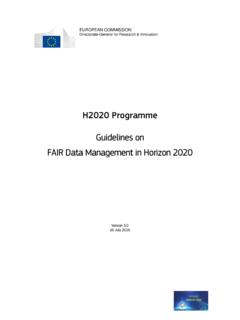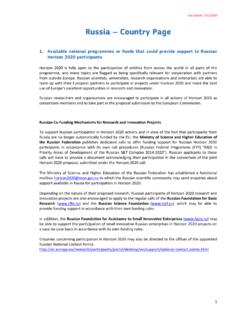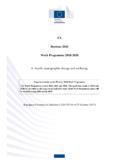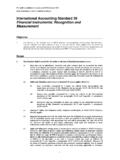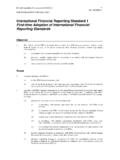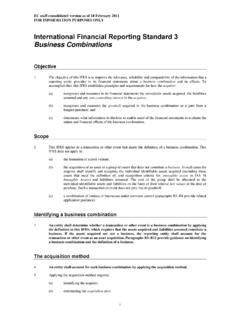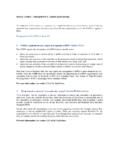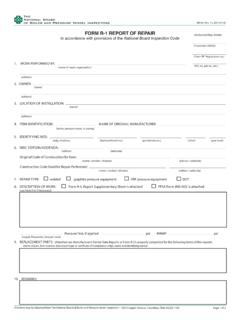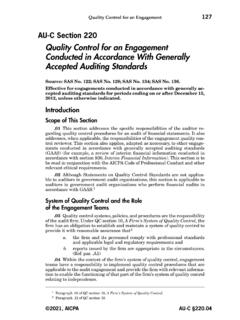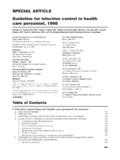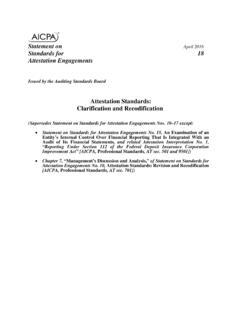Transcription of Frequently asked questions: How should financial and non ...
1 1 FAQs: How should financial and non- financial undertakings report Taxonomy-eligible economic activities and assets in accordance with the Taxonomy Regulation Article 8 Disclosures Delegated Act? The purpose of this Frequently asked Questions (FAQs) document is to provide implementation guidance on the content of the Disclosures Delegated Act under Article 8 of EU Taxonomy Regulation ( Disclosures Delegated Act ). 1 The Commission intends to update these FAQs on a regular basis. Further FAQs about the Article 8 Disclosures Delegated Act will be made available on the same webpage. December 2021 (updated January 2022) 1 Commission Delegated Regulation (EU) 2021/2178 of 6 July 2021 supplementing Regulation (EU) 2020/852 of the European Parliament and of the Council by specifying the content and presentation of information to be disclosed by undertakings subject to Articles 19a or 29a of Directive 2013/34/EU concerning environmentally sustainable economic activities, and specifying the methodology to comply with that disclosure obligation.
2 2 Contents 1. What is the Disclosures Delegated Act of the Taxonomy Regulation Article 8? 3 2. What should financial and non- financial undertakings report and by when? 4 3. To what extent can accounting principles be applied in order to complement descriptions of economic activities from the Climate Delegated Act? 6 4. How should mixed groups composed of financial and non- financial undertakings, or with diversified and multiple lines of activities report? 6 5. should financial and non- financial undertakings use the Annexes provided in the Disclosure Delegated Act to report their eligibility disclosures? 7 6. What should undertakings with no Taxonomy-eligible economic activities report? 7 7. should Taxonomy-eligibility reporting as part of the Disclosures Delegated Act be externally assured? 8 8. should non- financial undertakings provide the three ratios in the context of Taxonomy- eligibility reporting (Turnover, CapEx, OpEx)?
3 8 9. How does the Disclosures Delegated Act define capital and operating expenditures? 9 10. should Taxonomy-eligible economic activities be reported in monetary amounts? 9 11. should financial undertakings report Taxonomy-eligibility based on their underlying entities Turnover/CapEx? 9 12. Can financial undertakings use estimates for Taxonomy-eligibility, when information is not available from the reporting firm in 2022? 10 13. should financial undertakings 'look through' their investments and portfolios to report Taxonomy-eligibility? 10 14. What assets are in scope of Taxonomy-eligibility reporting for financial undertakings? 10 15. Are derivative instruments in scope of Taxonomy-eligibility reporting? 11 16. What activities should an insurer and a reinsurer consider when reporting their underwriting activities in the context of Taxonomy-eligibility reporting?
4 11 17. should insurers and reinsurers consolidate their eligibility disclosures at group-level? 12 18. How should reinsurers report reinsurance risk/exposure in the absence of insurance policy-level data in 2022? 12 19. Does life insurance qualify as a Taxonomy-eligible activity? 13 20. Are the definitions used in the Disclosures Delegated Act reconcilable with those used for FINREP reporting (Commission Implementing Regulation (EU) 2021/451)? 13 21. Can green SME debt that is taxonomy-aligned be reported as eligible? 19 3 22. How does the Taxonomy Regulation Article 8 Delegated Act interact with the Regulatory Technical Standard (RTS) developed under the Sustainable Finance Disclosures Regulation (SFDR)? 20 Appendix Glossary of relevant terms, regulations and directives 21 1. What is the Disclosures Delegated Act of the Taxonomy Regulation Article 8? On 6 July 2021, the European Commission adopted the Delegated Act supplementing Article 8 of the Taxonomy Regulation ( the Disclosures Delegated Act ), which requires large financial and non- financial companies to provide information to investors about the environmental performance of their assets and economic activities.
5 The Delegated Act is published in the Official Journal and becomes applicable on 1 January 2022. The overall objective of the Disclosures Delegated Act is to increase transparency in the market. It will help financial market participants to design financial products and portfolios on the basis of disclosures from financial and non- financial undertakings. The Disclosures Delegated Act specifies the disclosure obligations under Article 8 of the Taxonomy Regulation (EU) 2020/8522. The Delegated Act specifies the content, methodology and presentation of information to be disclosed by large financial and non- financial undertakings on the share of their business, investments or lending activities that are aligned with the Taxonomy Regulation. Non- financial undertakings are in particular required according to Article 8(2) Taxonomy Regulation to disclose the share of their turnover, capital and operational expenditure associated with environmentally sustainable economic activities as defined in the Taxonomy Regulation and the EU Taxonomy Climate Delegated Act (EU) 2021/21393, as well as any future delegated acts on other environmental objectives.
6 In the case of financial undertakings (investment firms, asset managers, insurers, credit institutions), key performance indicators (KPIs) relate to the proportion of environmentally sustainable economic activities in their financing activities, such as lending, investment and 2 Regulation (EU) 2020/852 of the European Parliament and of the Council of 18 June 2020 on the establishment of a framework to facilitate sustainable investment, and amending Regulation (EU) 2019/2088, OJ L 198, , p. 13. 3 Commission Delegated Regulation (EU) 2021/2139 of 4 June 2021 supplementing Regulation (EU) 2020/852 of the European Parliament and of the Council by establishing the technical screening criteria for determining the conditions under which an economic activity qualifies as contributing substantially to climate change mitigation or climate change adaptation and for determining whether that economic activity causes no significant harm to any of the other environmental objectives, OJ L 442, , p.
7 1. 4 Article 8(2) of the Taxonomy Regulation specifies the key performance indicators (KPIs) related to turnover, capital expenditure and operational expenditure that non- financial undertakings must disclose, but it does not specify equivalent indicators for financial undertakings, mainly large banks, asset managers, investment firms, insurance and reinsurance undertakings. 4 2. What should financial and non- financial undertakings report and by when? The timeline for the application of reporting requirements is provided in Article 10 of the Disclosures Delegated Act, which is as follows: As of January 2022, in accordance with Article 10(2) and (3), all large undertakings will need to report the proportion of their activities (or the proportion of their exposures to activities) that are considered as eligible in accordance with Article 1(5) and non-eligible in accordance with Article 1(6) of the Disclosures Delegated Act in their turnover, capital ( CapEx ) and operational expenditure ( OpEx ) and total assets (in the case of financial undertakings).
8 5 Furthermore, financial undertakings (according to Annex XI) and non- financial undertakings (according to Section of Annex I) have to disclose qualitative information as of January 2022. In 2022, large entities are not required to assess the Taxonomy-alignment of these activities. They are also only required to report against activities contributing to climate objectives according to the EU Climate Delegated Act. As a general principle, eligibility reporting in the first year(s) of reporting, as per Article 10 of the Disclosures Delegated Act, should serve to help undertakings prepare for their alignment disclosures. To facilitate coherence in reporting between Taxonomy-eligibility and alignment reporting and to ensure coherence of the reporting across undertakings, it is suggested that financial undertaking-related disclosures should be based on actual information provided by the financial or non- financial underlying investee entity or counterparty, in accordance with Article 8(4) second subparagraph of the Disclosures Delegated Act.
9 In 2023, in accordance with Article 10(4) of the Disclosures Delegated Act, large non- financial undertakings will need to report the activities that are considered as aligned with the EU Climate Delegated Act. Similarly, and in accordance with Article 10(5) of the Disclosures Delegated Act, large financial institutions should disclose Taxonomy-eligible and aligned activities in 2024 for activities related to climate objectives. After a transition period of three years and as of January 2026, in accordance with the second subparagraph of Article 10(5), credit institutions will also need to report on the Taxonomy-alignment of their trading book and fees and commissions for non-banking activities. 5 Information shall be reported alongside the undertaking s non- financial or consolidated non- financial statements in accordance with Article 19a or Article 29a Accounting Directive 2013/34/EU of the European Parliament and of the Council of 26 June 2013 on the annual financial statements, consolidated financial statements and related reports of certain types of undertakings, amending Directive 2006/43/EC of the European Parliament and of the Council and repealing Council Directives 78/660/EEC and 83/349/EEC, OJ L 182, , p.
10 19 76, last amended by Directive (EU) 2021/2101 of the European Parliament and of the Council of 24 November 2021 amending Directive 2013/34/EU as regards disclosure of income tax information by certain undertakings and branches, OJ L 429, , p. 1. If undertakings publish non- financial information in a separate report according to Article 19a(4) or Article 29a(4) Directive 2013/34/EU, the Disclosures according to Article 8 Taxonomy Regulation shall be published in that separate report according to Article 8(3) Taxonomy Regulation. 5 Chart 1: What undertakings should report and by when * Article 8 (2) and (3) Disclosures Delegated Act stipulates that information disclosed in accordance with this Regulation shall cover the annual reporting period from the previous calendar year of the date of disclosure and that financial undertakings and non- financial undertakings shall provide in the non- financial statement the key performance indicators covering the previous annual reporting period.
